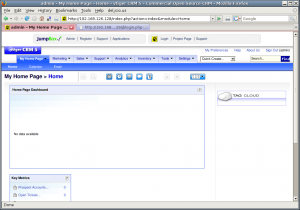CRM software, also called customer relationship software keeps records of many of the variables that constitute the vitality and essence of a business and what makes it successful. Keeping track of customers, suppliers, internal affairs, inventory, orders, maintenance of equipment and customer service can now be interrelated so that all systems can be integrated together into a master plan, if you will.
The sales function is more complex in today’s business environment in that it is not considered to be appropriate to simply walk into a prospects office and “cold call” without an appointment. Since prospects have all kinds of ways of responding to sales approaches, it is appropriate that the sales personnel respond in kind.
A CRM system can keep track of the progress of marketing and sales efforts, and be of great assistance in the usage of more sophisticated efforts such as direct mail, email marketing and social media marketing. The current approach to marketing effort is called “attraction marketing” where the prospective customer is given enough enticing information about the benefits of a product or service that the prospective client is “attracted” to the product by what he will be able to gain by purchasing it.
Since we are privy to much in the way of digital information, we are able as marketers to glean a lot of information about a prospective client before we even attempt to gain contact. We can find out what his business is, who he markets to, and to basically determine if what we have to offer can help him do what he does better. If that is determined to be the case, then we can be relentless in our efforts to win him over. We can gain so much information and tailor our approach so finitely that we can almost know what the prospect’s answers are going to be when he is approached.
With the CRM software, we can then record each move that is made in reaching out to the prospect, and then analyze our efforts so we can learn which methods and approaches have worked the best. As a relationship is built through correspondence, then perhaps and email or two, then moving the relationship up a level to a phone call, and perhaps a meeting, we are able to build that relationship to a solid level on the client’s terms.
 Once a prospect become a buyer, then the CRM system keeps track of all correspondence, communications, sales, shipments, and any correspondence that relates to any movement in the relationship. It will track orders, shipments, promotions, reactions to overtures of new products, and so forth.
Once a prospect become a buyer, then the CRM system keeps track of all correspondence, communications, sales, shipments, and any correspondence that relates to any movement in the relationship. It will track orders, shipments, promotions, reactions to overtures of new products, and so forth.
A CRM system just keeps tabs on everything that transpires in the relationship from now on, where one or two little details can mean a lot, and all of those details are now being recorded. From the standpoint of scheduling appointments for reviews, setting of objectives, and supplying all of the in between “glue” that keeps business relationships running, a CRM system certainly serves the function of keeping the data, and translating the data into meaningful reports.
CRM systems are becoming more and more “enterprise” in nature, meaning that the scope of the ability of the software to encompass all phases of a business operation is continually being enhanced. In this way less and less is required of humans in regard to mundane duties so the humans can concentrate more and more on relationships.
